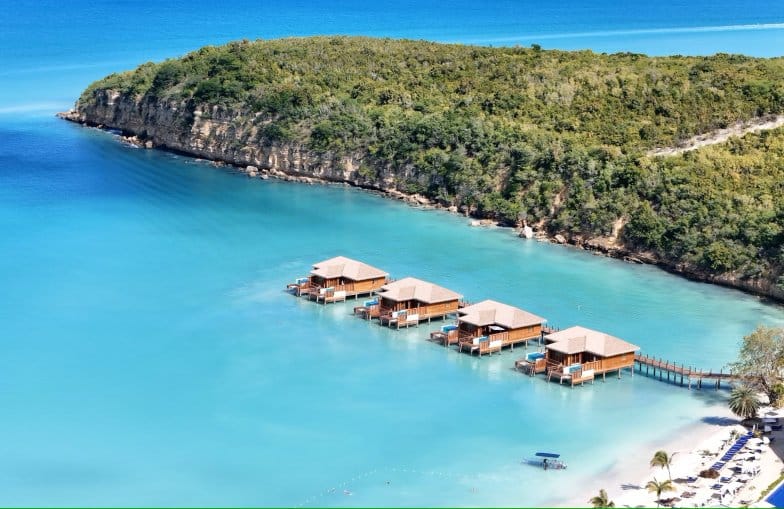Antigua’s claim to fame is its 365 beaches—one for every day of the year—but this tropical Caribbean island has a rich history that goes way beyond beach life. The appeal of Antigua tourism is built on a number of factors that travelers should be aware of to make the most of a visit.
- Planning a trip to Antigua
- Best places to stay in Antigua
- Antigua’s best attractions and experiences
- Antigua travel tips
Any time is a good time to visit Antigua and its white sand beaches, but proper planning beforehand can make all the difference when factoring in the seasonal weather, peak travel periods, and the island’s cultural events calendar.
Best time to visit
Weather
Crowds and festivals
The prime window for a trip to Antigua is mid-December to mid-April, the height of peak season. It’s ideal for escaping the cold and dreary weather in the USA or Europe and is when most events on the island take place. Between May and June is another great option, just after peak season for those who want to avoid crowds.
Antigua Carnival: Held yearly in late July to early August, Antigua and Barbuda’s carnival is a monumental event commemorating emancipation. Energetic street parades with artfully designed carnival outfits, thumping Soca and calypso music, and the famous J’ouvert and other high-energy events run throughout the week.
Antigua Sailing Week: Kicking off in 1967, Antigua’s Sailing Week is one of the world’s top regattas. The regatta is held in late April and early May, and its annual average of 100 yachts, 1,500 sailors, and 5,000 spectators transform the quaint island into a yacht enthusiast’s dream.
Antigua and Barbuda Art Week: Antigua and Barbuda’s Art Week takes place during the closing weeks of the year from late November to early December. The Culture in Colour art exhibition showcases some of the works from the island’s top artists. The week showcases more than just art displays, featuring outdoor movie nights and live band sets.
Visa requirements
Getting there
As a prime Caribbean destination, getting to Antigua is relatively straightforward, with the island offering direct flights from several hubs. Airlines, including American Islands, JetBlue, WestJet, Air Canada, Delta, and British Airways, offer nonstop flights to and from New York, Miami, Atlanta, Toronto, and London.
For visitors traveling from other Caribbean islands, InterCaribbean Airways, Caribbean Airlines, Winair, LIAT, and Frontier offer regional nonstop flights from ten Caribbean countries and territories.
Hotels and resorts
Barbuda Belle Luxury Beach Hotel: Barbuda Belle Luxury Beach Hotel is one of the best hotels in Antigua and Barbuda. It is a family-run hotel overlooking Codrington Lagoon Park with seven private beach bungalows and a top-ranked seafood restaurant.
Cocobay Resort: Located in Valley Church, Cocobay Resort is one of the country’s high-end resorts, popular among visitors and expats living in Antigua. The all-inclusive, adults-only resort offers a romantic getaway with luxury cottages and an outstanding concierge service.
The Verandah Resort & Spa: The Verandah Resort & Spa in Dian Bay offers incredible scenery and a beautiful beach. Visitors can choose between hillside suites that overlook the resort’s lush gardens and waterfront suites for uninterrupted views of the Caribbean Sea.
Boutique properties
South Coast Horizons: Located between the Boggy Peak mountain range, South Coast Horizons offers boutique accommodations with a home-away-from-home feel. Guests can combine accommodation with kayaking, snorkeling, and other nearby activities.
Pigeon Point Villas: Pigeon Point Villas is an Antigua real estate development offering fully furnished luxury apartments and villas for short-term and long-term stays. The villas are located minutes from the historic Nelson’s Dockyard, a UNESCO World Heritage Site.
Visit Shirley Heights Lookout
A visit to Shirley Heights Lookout is among the most talked-about things to do in Antigua and Barbuda. The local restaurant on the south coast offers a taste of the island’s character with live music, local delicacies, and extraordinary sunset views over the Lookout.
Stroll through Nelson’s Dockyard
Part of the Antigua Naval Dockyard UNESCO World Heritage Site, Nelson’s Dockyard offers a picture of Antigua’s history. The preserved architecture and Dockyard Museum allow visitors to step back into Antigua’s naval heritage.
Climb Mount Obama
Named after former US President Barack Obama, the 1,300-foot Mount Obama is the highest point in Antigua and ideal for seasoned and casual climbers. The climb takes around one to three hours, depending on where you enter, and on a clear day, the peak offers iconic views of Antigua and neighboring islands.
Explore Fort James
Fort James was one of Antigua’s key strongholds. Located a short distance from V.C. Bird International Airport, the Fort is a highlight of Caribbean tourism, featuring impressive cannons and other elements of the island’s colonial era alongside postcard views of the coastline.
Getting around Antigua
At just 108 square miles, the best way to travel across Antigua is by rental car or private taxi. A rental can save money if you visit a few places or plan an extended trip. International rental agencies like Budget, Avis, Hertz, and local companies like Sandy Feet Car Rental Antigua and Drive-A-Matic Car Rentals offer rental cars outside the V.C. Bird International Airport arrival hall. Daily rates vary depending on the company but can cost as little as $50 per day, excluding taxes and insurance.
You can opt for private taxis or transfer services if you prefer to avoid the tight country roads and erratic Caribbean driving style. Taxi rides from the airport to Caribbean hotels on the island’s north side will cost upwards of $25 and at least $50 for hotels on the south side. Taxi fares aren’t government-regulated, so prices vary between companies, destinations, and passenger numbers.
Safety
Regarding safety in Antigua, the country has one of the lowest crime rates in the Caribbean, with a travel advisory level of “Exercise normal precautions” published by the US Department of State. With that said, theft and targeted robberies can occur. Staying alert and exercising common sense by leaving valuables in a hotel safe and avoiding lonely streets at night and unfamiliar locations outside tourist destinations can ensure a trouble-free travel experience.
Culture and customs
Saving Money in Antigua
- Plan a visit outside peak season: Daily hotel rates and flight prices can drop significantly in off-peak months like May and November.
- Rent a car: If you intend to move around frequently or spend an extended period in Antigua, renting a car is a better investment than taking numerous private taxis.
- Buy a local SIM card: While many telecom companies offer reasonable internal data packages, roaming charges in Caribbean countries can be high. Local telecommunication service providers like Flow and Digicel offer seven-day data packages for under $20.





